- Home
- Leslie Meier
St. Patrick's Day Murder
St. Patrick's Day Murder Read online
ST. PATRICK’S DAY MURDER
Lucy returned to her soup, chopping up carrots and celery and adding them to the pot. Moira hadn’t said when she would pick Deirdre up, and Lucy wondered if she would still be with them at dinnertime. The Malones were an odd sort of family, she thought as she stirred the pot. Not exactly irresponsible parents, but awfully eager to assign child care duties to someone else. And then there was the day they had discovered Old Dan’s body, the very same day Dylan had come to the newspaper seeking news of his brother. She remembered it clearly, how he’d come through the door, claiming he was right off the airplane, straight from Ireland that very day.
Maybe it was just a phrase, a bit of blarney, as Miss Tilley put it, or maybe Dylan Malone had indeed arrived in the country days ahead of his family. But why would he bother to lie about it? Perhaps he had a reason for keeping that information to himself…
Books by Leslie Meier
Mistletoe Murder
Tippy Toe Murder
Trick or Treat Murder
Back to School Murder
Valentine Murder
Christmas Cookie Murder
Turkey Day Murder
Wedding Day Murder
Birthday Party Murder
Father’s Day Murder
Star Spangled Murder
New Year’s Eve Murder
Bake Sale Murder
Candy Cane Murder
St. Patrick’s Day Murder
Mother’s Day Murder
Published by Kensington Publishing Corporation
St. Patrick’s Day MURDER
LESLIE MEIER
Kensington Publishing Corp.
http://www.kensingtonbooks.com
For Kevin and Beryl Daley
Acknowledgments
Much thanks to Joyce Flynn and Phil O’Leary.
Contents
Prologue
Chapter One
Chapter Two
Chapter Three
Chapter Four
Chapter Five
Chapter Six
Chapter Seven
Chapter Eight
Chapter Nine
Chapter Ten
Chapter Eleven
Chapter Twelve
Chapter Thirteen
Chapter Fourteen
Chapter Fifteen
Chapter Sixteen
Chapter Seventeen
Chapter Eighteen
Chapter Nineteen
Chapter Twenty
Prologue
The last customer hadn’t left the bar until nearly two a.m.—well past the eleven p.m. closing time mandated by the town bylaws in Tinker’s Cove, Maine—but that didn’t bother Old Dan very much. He’d never been one to fuss about rules and regulations. No, he was one who took the inch and made it a mile. If they wanted him to close at eleven, well, they could jolly well send over a cop or two or ten and make him. Though he’d be willing to wager that wouldn’t go down well with the clientele. He chuckled and scratched his chin, with its week’s worth of grizzled whiskers. That crowd, mostly rough and ready fishermen, didn’t have a high regard for the law, or for the cops who enforced it, either. No, close the Bilge before the customers were ready to call it a night, and there’d be a fine brouhaha.
And, anyway, he didn’t sleep well these days, so there was no sense tossing out some poor soul before he was ready to go, because, truth be told, he didn’t mind a bit of company in the wee hours. He knew that if he went home and to bed, he’d only be twisting and turning in the sheets, unable to calm his thoughts enough to sleep.
That’s why he’d started tidying the bar at night instead of leaving it for the morning. The rhythmic tasks soothed him. Rinsing and drying the glasses, rubbing down the bar. Wiping the tables, giving the floor a bit of a sweep. That’s what he was doing, shuffling along behind a push broom to clear away all the dropped cigarette butts and matches and dirt carried in on cleated winter boots. He braced himself for the blast of cold and opened the door to sweep it all out, back where it belonged. But it wasn’t the cold that took his breath away. It was a bird, a big crow, and it walked right in.
“And what do you think you’re doing?” he demanded, feeling a large hollowness growing inside him.
“You know quite well, don’t you?” replied the crow, hopping up onto the bar with a neat flap of his wings. The bird cocked his head and looked him in the eye. “Don’t tell me an Irishman like you, born and bred in the old country, has forgotten the tale of Cú Chulainn?”
He’d not forgotten. He’d heard the story often as a boy, long ago in Ireland, where his mother dished up the old stories with his morning bowl of oats. “Eat up,” she’d say, “so you’ll be as strong as Cú Chulainn.”
He found his mind wandering and followed it down the dark paths of memory. Had it really been that long? Sixty odd years? More than half a century? It seemed like yesterday that he was tagging along behind his ma when she made the monthly trek to the post office to pay the bills. “’Tisn’t the sort of thing you can forget,” he told the crow. “Especially that statue in the Dublin General Post Office. A handsome piece of work that is, illustrating how Cú Chulainn knew death was near and tied himself to a post so he could die standing upright, like the hero he was.”
“Cú Chulainn was a hero indeed,” admitted the crow. “And his enemies couldn’t kill him until the Morrighan lit on his shoulder, stealing his strength, weakening him….”
“Right you are. The Morrighan,” he said. The very thought of that fearsome warrior goddess, with her crimson cloak and chariot, set his heart to pounding in his bony old chest.
“And what form did the Morrighan take, might I ask?” inquired the bird.
“A crow,” he said, feeling a great trembling overtake him. “So is that it? Are you the Morrighan come for me?”
“What do you think, Daniel Malone?” replied the crow, stretching out its wings with a snap and a flap and growing larger, until its great immensity blocked out the light—first the amber glow of the neon Guinness sign, then the yellow light from the spotted ceiling fixture, the greenish light from the streetlamp outside, and finally, even the silvery light from the moon—and all was darkness.
Chapter One
Maybe it was global warming, maybe it was simply a warmer winter than usual, but it seemed awfully early for the snow to be melting. It was only the last day of January, and in the little coastal town of Tinker’s Cove, Maine, that usually meant at least two more months of ice and snow. Instead, the sidewalks and roads were clear, and the snow cover was definitely retreating, revealing the occasional clump of snowdrops and, in sheltered nooks with southern exposures, a few bright green spikes of daffodil leaves that were prematurely poking through the earth.
You could almost believe that spring was in the air, thought Lucy Stone, part-time reporter for the town’s weekly newspaper, the Pennysaver. She wasn’t sure how she felt about it. Part of her believed it was too good to be true, probably an indicator of future disasters, but right now the sun was shining and birds were chirping and it was a great day to be alive. So lovely, in fact, that she decided to walk the three or four blocks to the harbor, where she had an appointment to interview the new harbormaster, Harry Crawford.
As she walked down Main Street, she heard the steady drip of snow melting off the roofs. She felt a gentle breeze against her face, lifting the hair that escaped from her beret, and she unfastened the top button of her winter coat. Quite a few people were out and about, taking advantage of the unseasonably fine weather to run some errands, and everyone seemed eager to exchange greetings. “Nice day, innit?” and “Wonderful weather, just wonderful,” they said, casting suspicious eyes at the sky. Only the letter carrier Wilf Lundgr
en, who she met at the corner of Sea Street, voiced what everyone was thinking. “Too good to be true,” he said, with a knowing nod. “Can’t last.”
Well, it probably wouldn’t, thought Lucy. Nothing did. But that didn’t mean she couldn’t enjoy it in the meantime. Her steps speeded up as she negotiated the hill leading down to the harbor, where the ice pack was beginning to break up. All the boats had been pulled from the water months ago and now rested on racks in the parking lot, shrouded with tarps or shiny white plastic shrink-wrap. The gulls were gone—they didn’t hang around where there was no food—but a couple of crows were flying in circles above her head, cawing at each other.
“The quintessential New England sound,” someone had called it, she remembered, but she couldn’t remember who. It was true, though. There was something about their raspy cries that seemed to capture all the harsh, unyielding nature of the landscape. And the people who lived here, she thought, with a wry smile.
Harry Crawford, the new harbormaster, was an exception. He wasn’t old and crusty like so many of the locals; he was young and brimming with enthusiasm for his job. He greeted Lucy warmly, holding open the door to his waterfront office, which was about the same size as a highway tollbooth. It was toasty inside, thanks to the sun streaming through the windows, which gave him a 360-degree view of the harbor and parking lot. Today he hadn’t even switched on the small electric heater.
“Hi, Lucy. Make yourself comfortable,” he said, pulling out the only chair for her to sit on. He leaned against the half wall, arms folded across his chest, staring out at the water. It was something people here did, she thought. They followed the water like a sunflower follows the sun, keeping a watchful eye out for signs that the placid, sleeping giant that lay on the doorstep might be waking and brewing up a storm.
“Thanks, Harry,” she said, sitting down and pulling off her gloves. She dug around in her bag and fished out a notebook and pen. “So tell me about the Waterways Committee’s plans for the harbor.”
“Here, here,” he said, leaning over her shoulder to unroll the plan and spread it out on the desk. “They’re going to add thirty more slips, and at over three thousand dollars a season, it adds up to nearly a hundred thousand dollars for the town.”
“If you can rent them,” said Lucy.
“Oh, we can. We’ve got a waiting list.” He shaded his eyes with his hand and looked past her, out toward the water. “And that’s another good thing. A lot of folks have been on that list for years, and there’s been a lot of bad feeling about it. You know, people are not really using their slips, but hanging on to them for their kids, stuff like that. But now we ought to be able to satisfy everyone.”
Lucy nodded. She knew there was a lot of resentment toward those who had slips from those who didn’t. It was a nuisance to have to ferry yourself and your stuff and your crew out to a mooring in a dinghy. With a slip, you could just walk along the dock to the boat, untie it, and sail off. “So you think this will make everybody happy?” she asked. “What about environmental issues? I understand there will be some dredging.”
He didn’t answer. His gaze was riveted on something outside that had caught his attention. “Sorry, Lucy. There’s something I gotta check on,” he said, taking his jacket off a hook.
Lucy turned and looked outside, where a flock of gulls and crows had congregated at the end of the pier. “What’s going on?” she asked.
“The ice is breaking up. Something’s probably come to the surface.”
From the excited cries of the gulls, who were now arriving from all directions, she knew it must be something they considered a meal. A feast, in fact.
“Like a pilot whale?”
“Could be. Maybe a sea turtle, a dolphin even. Could be anything.”
“I’d better come,” she said, with a groan, reluctantly pulling a camera out of her bag.
“I wouldn’t if I were you,” he said, shaking his head. “Whatever it is, it’s not going to be pretty, not this time of year. It could’ve been dead for months.”
“Oh, I’m used to it,” sighed Lucy, who had tasted plenty of bile photographing everything from slimy, half-rotted giant squid tentacles caught in fishing nets to bloated whale carcasses that washed up on the beach.
“Trust me. The stench alone…”
She was already beginning to feel queasy. “You’ve convinced me,” she said, guiltily replacing her camera. Any photo she took would probably be too disgusting to print, she rationalized, and she could call him later in the day and find out what it was. Meanwhile, her interest had been caught by a handful of people gathered outside the Bilge, on the landward side of the parking lot. Tucked in the basement beneath a block of stores that fronted Main Street, the Bilge was a Tinker’s Cove landmark—and a steady source of news. It was the very opposite of Hemingway’s “clean, well-lighted place,” but that didn’t bother the fishermen who packed the place. It may have been a dark and dingy dive, but the beer was cheap, and Old Dan never turned a paying customer away, not even if he was straight off the boat and stank of lobster bait.
Lucy checked her watch as she crossed the parking lot and discovered it was only a little past ten o’clock. Kind of early to start drinking, she thought, but the three men standing in front of the Bilge apparently thought otherwise.
“It’s never been closed like this before,” said one. He was about fifty, stout, with white hair combed straight back from a ruddy face.
“Old Dan’s like clockwork. You could set your watch by it. The Bilge opens at ten o’clock. No earlier. No later,” said another, a thin man with wire-rimmed glasses.
“He closed once for a couple of weeks, maybe five or six years ago,” said the third, a young guy with long hair caught in a ponytail, who Lucy knew played guitar with a local rock band, the Claws. “He went to Florida that time, for a visit. But he left a sign.”
“What’s up? Is the Bilge closed?” she asked.
They all turned and stared at her. Women usually avoided the Bilge, where they weren’t exactly welcome. A lot of fishermen still clung to the old-fashioned notion that women were bad luck on a boat—and in general.
“I’m Lucy Stone, from the Pennysaver,” she said. “If the Bilge has really closed, that’s big news.”
“It’s been shut tight for three days now,” said the guy with the ponytail.
“Do you mind telling me your name?” she asked, opening her notebook. “It’s Dave, right? You’re with the Claws?”
“Dave Reilly,” he said, giving her a dazzling, dimpled smile.
Ah, to be on the fair side of thirty once more, she thought, admiring Dave’s fair hair, bronzed skin, full lips, and white teeth. He must be quite a hit with the girls, she decided, reminding herself that she had a job to do. “Has anybody seen Old Dan around town?” she asked.
“Come to think of it, no,” said the guy with glasses.
“And your name is?” she replied.
“Brian Donahue.”
“Do you think something happened to him?” she asked the stout guy, who was cupping his hands around his eyes and trying to see through the small window set in the door.
“Whaddya see, Frank?” inquired Dave. He turned to Lucy. “That’s Frank Cahill. You’d never know it, but he plays the organ at the church.”
“Is he inside? Did he have a heart attack or something?” asked Brian.
Frank shook his head. “Can’t see nothing wrong. It looks the same as always.”
“Same as always, except we’re not inside,” said Brian.
“Hey, maybe we’re in some sort of alternate universe. You know what I mean. We’re really in the Bilge in the real world, having our morning pick-me-up just like usual, but we’re also in this parallel world, where we’re in the parking lot,” said Dave.
The other two looked at each other. “You better stick to beer, boy,” said Frank, with a shake of his head. “Them drugs do a job on your brain.”
“What am I supposed to do?” replied the r
ocker. “It’s not my fault if Old Dan is closed, is it? A guy’s gotta have something. Know what I mean?”
“You could try staying sober,” said Lucy.
All three looked at her as if she were crazy.
“Or find another bar,” she added.
“The others don’t open ’til noon,” said Brian. “Town bylaw.”
“Old Dan has a special dispensation?” she asked.
The others laughed. “You could say that,” said Dave, with a bit of an edge in his voice. “He sure doesn’t play by the same rules as the rest of us.”
“Special permission. That’s good,” said Brian.
“Yeah, like from the pope,” said Frank, slapping his thigh. “I’ll have to tell that one to Father Ed.” He checked his watch. “Come to think of it, I wonder where he is? He usually stops in around now.”
My goodness, thought Lucy, echoing her great-grandmother who had been a staunch member of the Woman’s Christian Temperance Union. She knew there was a lot of drinking in Tinker’s Cove, especially in the winter, when the boats sat idle. Some joker had even printed up bumper stickers proclaiming: “Tinker’s Cove: A quaint little drinking village with a fishing problem,” when government regulators had started placing tight restrictions on what kind of fish and how much of it they could catch and when they could catch it. She’d laughed when she first saw the sticker on a battered old pickup truck. After all, she wasn’t above pouring herself a glass of wine to sip while she cooked supper. She certainly wasn’t a teetotaler, but her Puritan soul certainly didn’t approve of drinking in the morning.

 Christmas Card Murder
Christmas Card Murder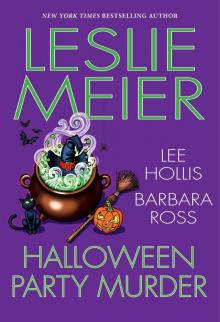 Halloween Party Murder
Halloween Party Murder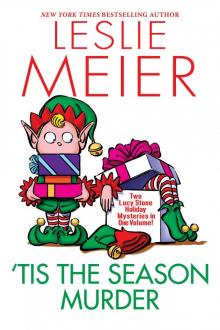 'Tis the Season Murder
'Tis the Season Murder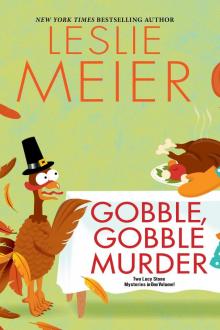 Gobble, Gobble Murder
Gobble, Gobble Murder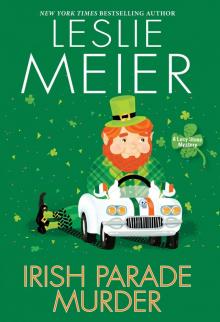 Irish Parade Murder
Irish Parade Murder Bake Sale Murder
Bake Sale Murder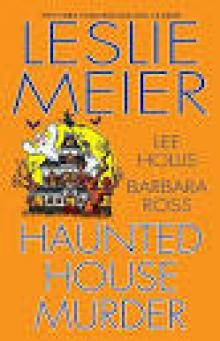 Haunted House Murder
Haunted House Murder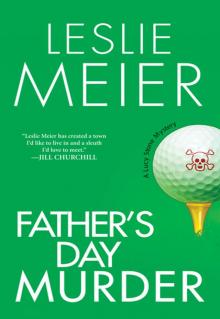 Father’s Day Murder
Father’s Day Murder Chocolate Covered Murder
Chocolate Covered Murder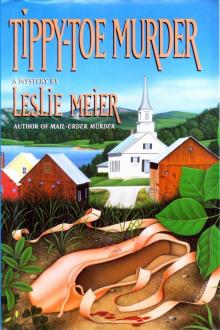 Tippy Toe Murder
Tippy Toe Murder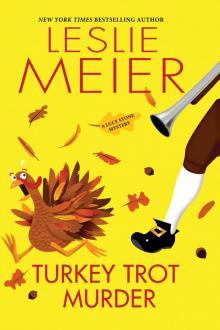 Turkey Trot Murder
Turkey Trot Murder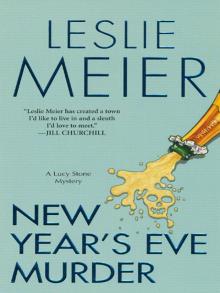 New Year's Eve Murder
New Year's Eve Murder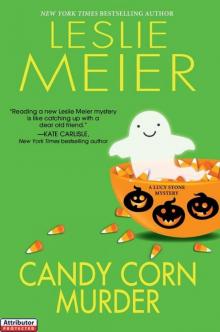 Candy Corn Murder
Candy Corn Murder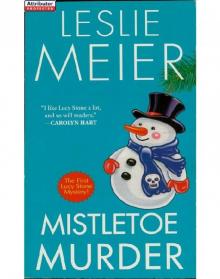 Mistletoe Murder
Mistletoe Murder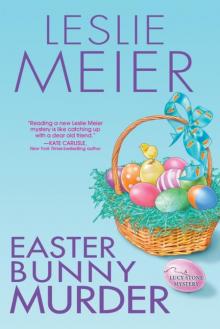 LStone 20 - Easter Bunny Murder
LStone 20 - Easter Bunny Murder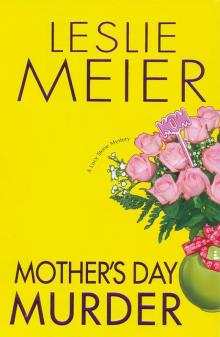 Mother's Day Murder
Mother's Day Murder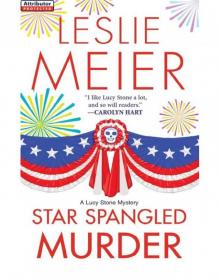 Star Spangled Murder
Star Spangled Murder Silver Anniversary Murder
Silver Anniversary Murder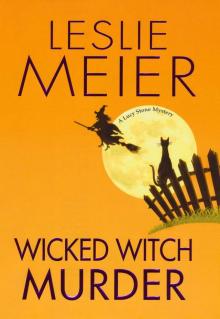 Wicked Witch Murder
Wicked Witch Murder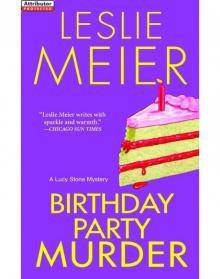 Birthday Party Murder
Birthday Party Murder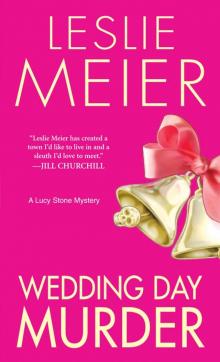 Wedding Day Murder
Wedding Day Murder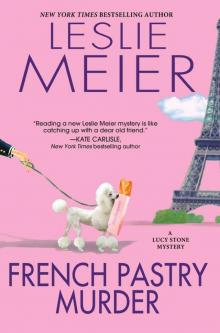 French Pastry Murder
French Pastry Murder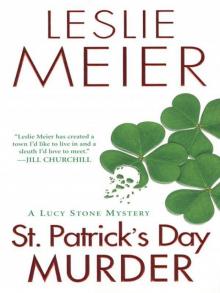 St. Patrick's Day Murder
St. Patrick's Day Murder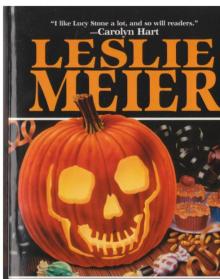 Trick or Treat Murder
Trick or Treat Murder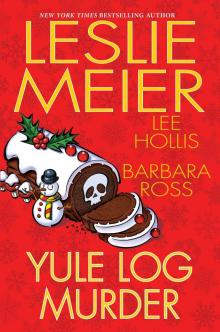 Yule Log Murder
Yule Log Murder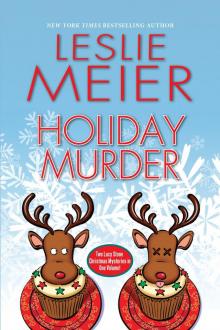 Holiday Murder
Holiday Murder British Manor Murder
British Manor Murder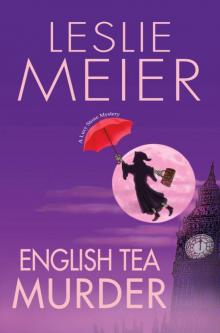 English Tea Murder
English Tea Murder